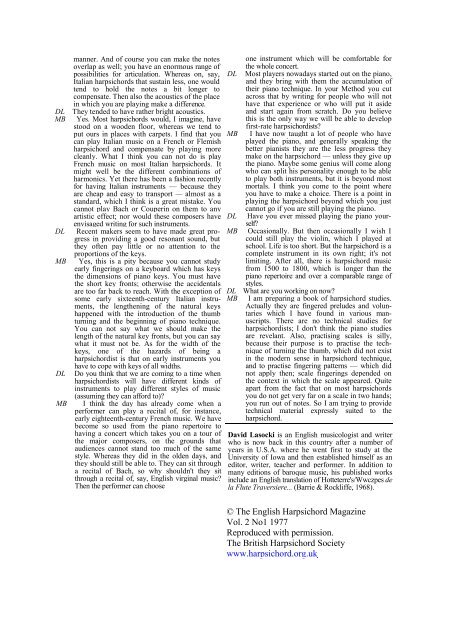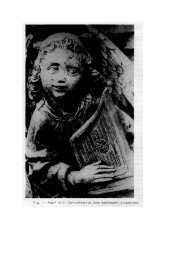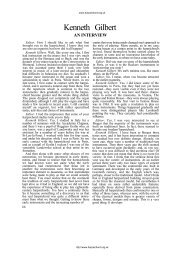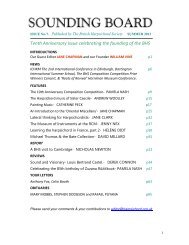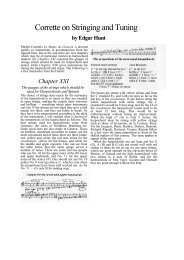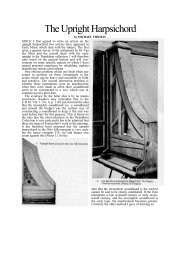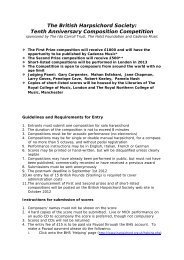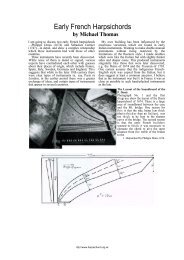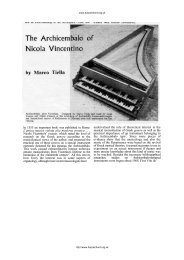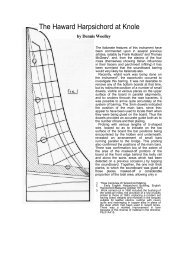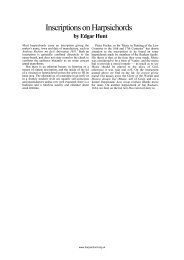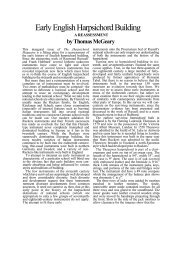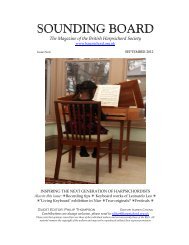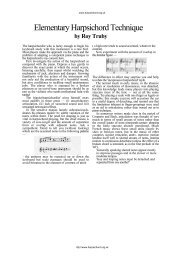Maria Boxall Interviewed. - British Harpsichord Society
Maria Boxall Interviewed. - British Harpsichord Society
Maria Boxall Interviewed. - British Harpsichord Society
Create successful ePaper yourself
Turn your PDF publications into a flip-book with our unique Google optimized e-Paper software.
DL<br />
MB<br />
DL<br />
MB<br />
DL<br />
MB<br />
manner. And of course you can make the notes<br />
overlap as well; you have an enormous range of<br />
possibilities for articulation. Whereas on, say,<br />
Italian harpsichords that sustain less, one would<br />
tend to hold the notes a bit longer to<br />
compensate. Then also the acoustics of the place<br />
in which you are playing make a difference.<br />
They tended to have rather bright acoustics.<br />
Yes. Most harpsichords would, I imagine, have<br />
stood on a wooden floor, whereas we tend to<br />
put ours in places with carpets. I find that you<br />
can play Italian music on a French or Flemish<br />
harpsichord and compensate by playing more<br />
cleanly. What I think you can not do is play<br />
French music on most Italian harpsichords. It<br />
might well be the different combinations of<br />
harmonics. Yet there has been a fashion recently<br />
for having Italian instruments — because they<br />
are cheap and easy to transport — almost as a<br />
standard, which I think is a great mistake. You<br />
cannot play Bach or Couperin on them to any<br />
artistic effect; nor would these composers have<br />
envisaged writing for such instruments.<br />
Recent makers seem to have made great progress<br />
in providing a good resonant sound, but<br />
they often pay little or no attention to the<br />
proportions of the keys.<br />
Yes, this is a pity because you cannot study<br />
early fingerings on a keyboard which has keys<br />
the dimensions of piano keys. You must have<br />
the short key fronts; otherwise the accidentals<br />
are too far back to reach. With the exception of<br />
some early sixteenth-century Italian instruments,<br />
the lengthening of the natural keys<br />
happened with the introduction of the thumb<br />
turning and the beginning of piano technique.<br />
You can not say what we should make the<br />
length of the natural key fronts, but you can say<br />
what it must not be. As for the width of the<br />
keys, one of the hazards of being a<br />
harpsichordist is that on early instruments you<br />
have to cope with keys of all widths.<br />
Do you think that we are coming to a time when<br />
harpsichordists will have different kinds of<br />
instruments to play different styles of music<br />
(assuming they can afford to)?<br />
I think the day has already come when a<br />
performer can play a recital of, for instance,<br />
early eighteenth-century French music. We have<br />
become so used from the piano repertoire to<br />
having a concert which takes you on a tour of<br />
the major composers, on the grounds that<br />
audiences cannot stand too much of the same<br />
style. Whereas they did in the olden days, and<br />
they should still be able to. They can sit through<br />
a recital of Bach, so why shouldn't they sit<br />
through a recital of, say, English virginal music?<br />
Then the performer can choose<br />
one instrument which will be comfortable for<br />
the whole concert.<br />
DL Most players nowadays started out on the piano,<br />
and they bring with them the accumulation of<br />
their piano technique. In your Method you cut<br />
across that by writing for people who will not<br />
have that experience or who will put it aside<br />
and start again from scratch. Do you believe<br />
this is the only way we will be able to develop<br />
first-rate harpsichordists?<br />
MB I have now taught a lot of people who have<br />
played the piano, and generally speaking the<br />
better pianists they are the less progress they<br />
make on the harpsichord — unless they give up<br />
the piano. Maybe some genius will come along<br />
who can split his personality enough to be able<br />
to play both instruments, but it is beyond most<br />
mortals. I think you come to the point where<br />
you have to make a choice. There is a point in<br />
playing the harpsichord beyond which you just<br />
cannot go if you are still playing the piano.<br />
DL Have you ever missed playing the piano yourself?<br />
MB Occasionally. But then occasionally I wish I<br />
could still play the violin, which I played at<br />
school. Life is too short. But the harpsichord is a<br />
complete instrument in its own right; it's not<br />
limiting. After all, there is harpsichord music<br />
from 1500 to 1800, which is longer than the<br />
piano repertoire and over a comparable range of<br />
styles.<br />
DL What are you working on now?<br />
MB I am preparing a book of harpsichord studies.<br />
Actually they are fingered preludes and voluntaries<br />
which I have found in various manuscripts.<br />
There are no technical studies for<br />
harpsichordists; I don't think the piano studies<br />
are revelant. Also, practising scales is silly,<br />
because their purpose is to practise the technique<br />
of turning the thumb, which did not exist<br />
in the modern sense in harpsichord technique,<br />
and to practise fingering patterns — which did<br />
not apply then; scale fingerings depended on<br />
the context in which the scale appeared. Quite<br />
apart from the fact that on most harpsichords<br />
you do not get very far on a scale in two hands;<br />
you run out of notes. So I am trying to provide<br />
technical material expressly suited to the<br />
harpsichord.<br />
David Lasocki is an English musicologist and writer<br />
who is now back in this country after a number of<br />
years in U.S.A. where he went first to study at the<br />
University of Iowa and then established himself as an<br />
editor, writer, teacher and performer. In addition to<br />
many editions of baroque music, his published works<br />
include an English translation of Hotteterre's/Wwczpes de<br />
la Flute Traversiere... (Barrie & Rockliffe, 1968).<br />
© The English <strong>Harpsichord</strong> Magazine<br />
Vol. 2 No1 1977<br />
Reproduced with permission.<br />
The <strong>British</strong> <strong>Harpsichord</strong> <strong>Society</strong><br />
www.harpsichord.org.uk


